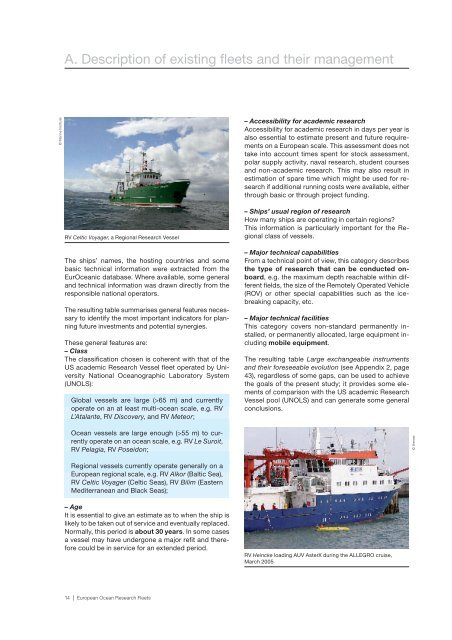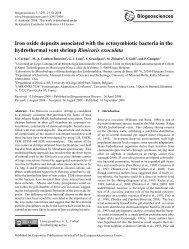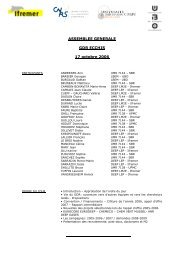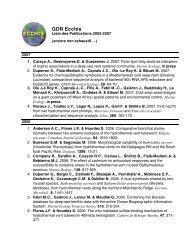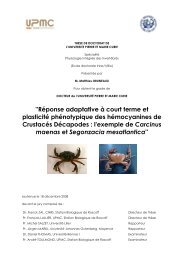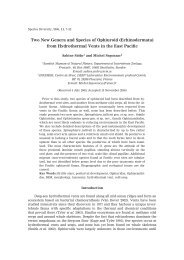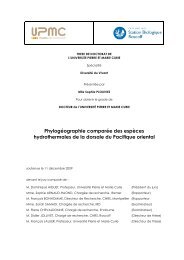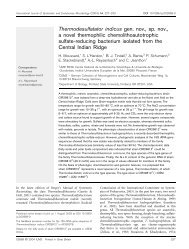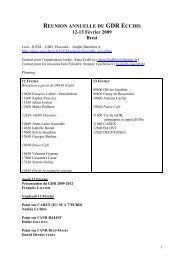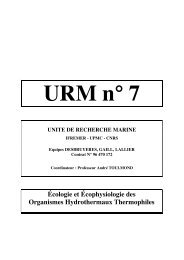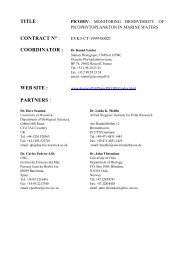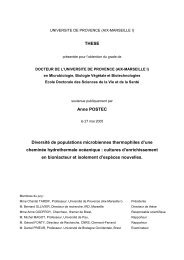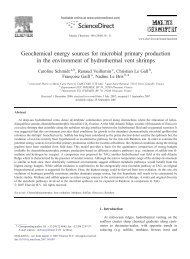European Ocean Research Fleets - uefiscdi
European Ocean Research Fleets - uefiscdi
European Ocean Research Fleets - uefiscdi
You also want an ePaper? Increase the reach of your titles
YUMPU automatically turns print PDFs into web optimized ePapers that Google loves.
A. Description of existing fleets and their management<br />
© Marine Institute<br />
– Accessibility for academic research<br />
Accessibility for academic research in days per year is<br />
also essential to estimate present and future requirements<br />
on a <strong>European</strong> scale. This assessment does not<br />
take into account times spent for stock assessment,<br />
polar supply activity, naval research, student courses<br />
and non-academic research. This may also result in<br />
estimation of spare time which might be used for research<br />
if additional running costs were available, either<br />
through basic or through project funding.<br />
RV Celtic Voyager, a Regional <strong>Research</strong> Vessel<br />
The ships’ names, the hosting countries and some<br />
basic technical information were extracted from the<br />
Eur<strong>Ocean</strong>ic database. Where available, some general<br />
and technical information was drawn directly from the<br />
responsible national operators.<br />
The resulting table summarises general features necessary<br />
to identify the most important indicators for planning<br />
future investments and potential synergies.<br />
These general features are:<br />
– Class<br />
The classification chosen is coherent with that of the<br />
US academic <strong>Research</strong> Vessel fleet operated by University<br />
National <strong>Ocean</strong>ographic Laboratory System<br />
(UNOLS):<br />
Global vessels are large (>65 m) and currently<br />
operate on an at least multi-ocean scale, e.g. RV<br />
L’Atalante, RV Discovery, and RV Meteor;<br />
<strong>Ocean</strong> vessels are large enough (>55 m) to currently<br />
operate on an ocean scale, e.g. RV Le Suroit,<br />
RV Pelagia, RV Poseidon;<br />
– Ships’ usual region of research<br />
How many ships are operating in certain regions?<br />
This information is particularly important for the Regional<br />
class of vessels.<br />
– Major technical capabilities<br />
From a technical point of view, this category describes<br />
the type of research that can be conducted onboard,<br />
e.g. the maximum depth reachable within different<br />
fields, the size of the Remotely Operated Vehicle<br />
(ROV) or other special capabilities such as the icebreaking<br />
capacity, etc.<br />
– Major technical facilities<br />
This category covers non-standard permanently installed,<br />
or permanently allocated, large equipment including<br />
mobile equipment.<br />
The resulting table Large exchangeable instruments<br />
and their foreseeable evolution (see Appendix 2, page<br />
43), regardless of some gaps, can be used to achieve<br />
the goals of the present study; it provides some elements<br />
of comparison with the US academic <strong>Research</strong><br />
Vessel pool (UNOLS) and can generate some general<br />
conclusions.<br />
© Ifremer<br />
Regional vessels currently operate generally on a<br />
<strong>European</strong> regional scale, e.g. RV Alkor (Baltic Sea),<br />
RV Celtic Voyager (Celtic Seas), RV Bilim (Eastern<br />
Mediterranean and Black Seas);<br />
– Age<br />
It is essential to give an estimate as to when the ship is<br />
likely to be taken out of service and eventually replaced.<br />
Normally, this period is about 30 years. In some cases<br />
a vessel may have undergone a major refi t and therefore<br />
could be in service for an extended period.<br />
RV Heincke loading AUV AsterX during the ALLEGRO cruise,<br />
March 2005<br />
14 | <strong>European</strong> <strong>Ocean</strong> <strong>Research</strong> <strong>Fleets</strong>


